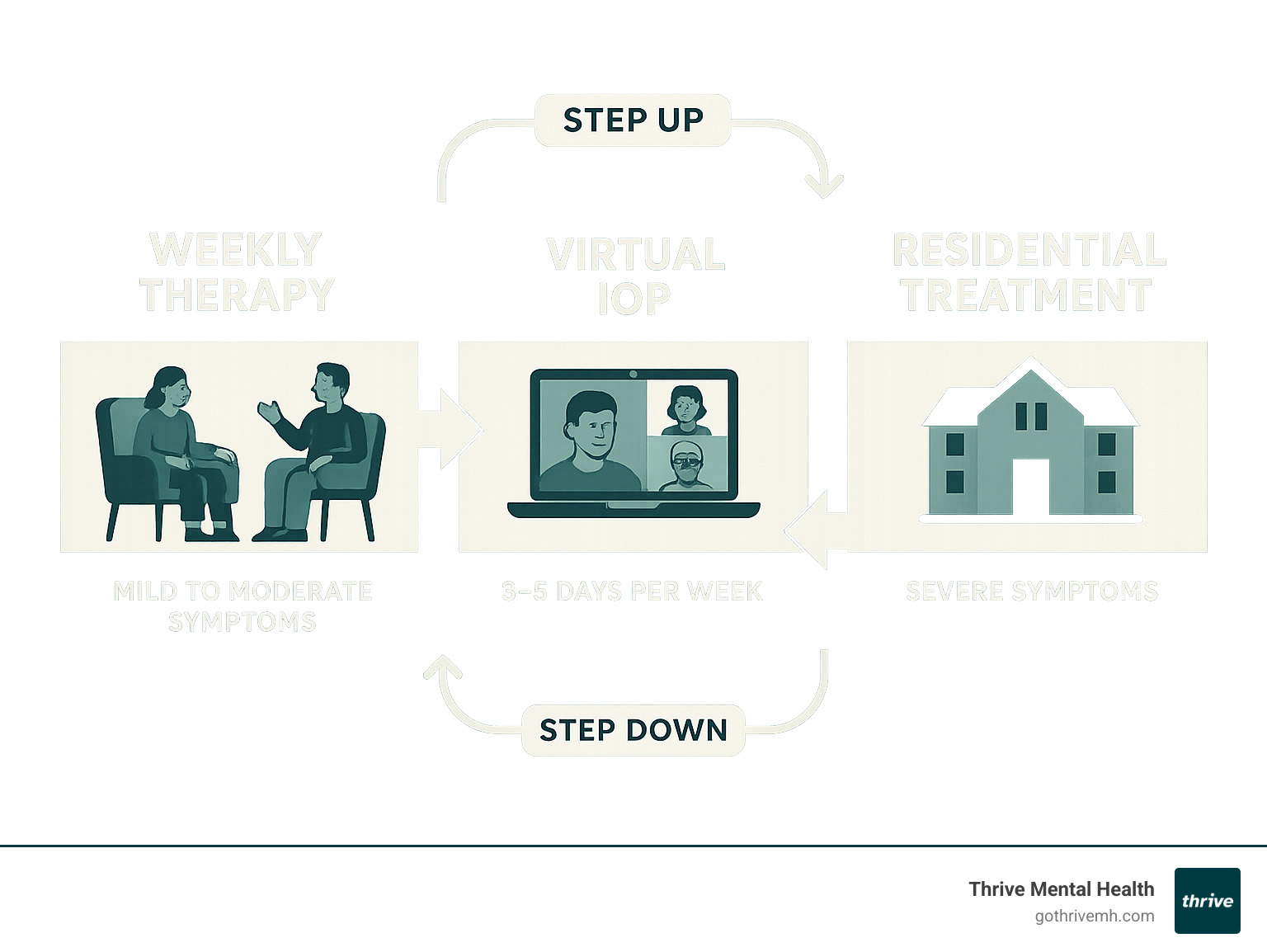Virtual IOP Programs Explained (No Pants Required!)

Why Virtual IOP Programs Are Changing Mental Healthcare
A virtual iop program offers intensive mental health treatment through secure online platforms, providing structured group therapy, individual sessions, and psychiatric support without requiring in-person visits. Here’s what you need to know:
Key Features:
- Structure: 3-5 days per week, 3 hours per day
- Duration: Typically 9-12 weeks
- Format: Group therapy, individual sessions, family therapy
- Access: From home via HIPAA-compliant video platforms
- Level of Care: More intensive than weekly therapy, less than residential treatment
Who It’s For:
- Young professionals with demanding schedules
- College students balancing academics
- People stepping down from higher levels of care
- Those needing more support than traditional therapy
Common Conditions Treated:
- Depression and anxiety disorders
- PTSD and trauma
- Substance use disorders
- Eating disorders
- Bipolar disorder
- Co-occurring conditions
For busy professionals, traditional weekly therapy often isn’t enough to manage the daily impact of anxiety, depression, or other conditions.
Virtual IOP programs bridge this gap, offering intensive, structured support that fits your schedule. You receive comprehensive treatment—including group and individual therapy plus psychiatric care—from the comfort of home.
Research shows virtual IOPs deliver clinical outcomes equivalent to in-person care with high patient satisfaction. They effectively remove common barriers like transportation, geography, and time constraints.
I’m Nate Raine, CEO of Thrive Mental Health. My experience in healthcare innovation has shown me how structured virtual programs can transform lives by making quality mental healthcare accessible to busy professionals.

Simple guide to virtual iop program:
What Exactly is a Virtual Intensive Outpatient Program?
Mental healthcare exists on a continuum. While weekly therapy offers ongoing support and residential treatment provides 24/7 care, a virtual iop program sits in the middle, offering intensive care without requiring you to live at a facility.
An Intensive Outpatient Program (IOP) is for those who need more support than traditional therapy but don’t require 24/7 supervision. It serves as “step-up care” from weekly sessions or “step-down care” when transitioning from residential or partial hospitalization programs.
A virtual iop program brings this proven model to you, delivering comprehensive, evidence-based care without the need to travel to a treatment center.
Outpatient treatment allows you to live at home while engaging in structured work for crisis stabilization and skill-building. Unlike Partial Hospitalization (PHP), which is a full-day commitment, IOP typically involves 3-5 days a week for a few hours each day. You can learn more about these distinctions at What is the Difference Between PHP and IOP?.
For a deeper understanding of how IOPs work in general, check out our guide: About Intensive Outpatient Program.
The Primary Purpose of an Online IOP
A virtual iop program exists to bridge the gaps in care that prevent people from getting help, eliminating worries about transportation, time off work, or living in an area with few options.
The core focus is on skill development and symptom management. Virtual IOP provides multiple opportunities each week to learn, practice, and refine coping strategies while maintaining your daily life.
This is ideal for busy professionals and students who need more support but can’t pause their lives. You can attend a session and immediately apply what you’ve learned, helping you manage work-life balance without adding more stress.
Practicing skills in your own environment means you’re integrating them into your actual life, making the transition out of treatment seamless. For more insight into how IOPs work, explore our A Comprehensive Guide to Intensive Outpatient Programs.
How is it Different from Traditional Therapy?
Compared to a standard 50-minute weekly therapy session, a virtual iop program offers significantly more intensity and time commitment, with several hours of treatment multiple days a week.
The group therapy component is a key feature. Many find the virtual format less intimidating, making it easier to connect with others who share similar experiences from the comfort of their own space.
What truly sets a virtual iop program apart is the multidisciplinary team approach. You have access to individual therapists, group facilitators, and psychiatrists, ensuring your mental health is addressed from every angle.
Integrated psychiatric support is also crucial. Regular access to psychiatric care for medication management within the program, rather than waiting for separate appointments, can significantly accelerate progress.
Traditional therapy is valuable, but when you need more intensive support, a virtual iop program provides comprehensive and convenient care. To learn more about our virtual therapy options, visit: Telehealth Therapy Outpatient Programs.
Who Can Benefit? Conditions Treated by Virtual IOP

A virtual iop program is accessible to people from all walks of life, including young professionals, college students, and parents managing family responsibilities. It’s an ideal option when weekly therapy isn’t enough, serving as a step-up from individual therapy or a step-down from a higher level of care.
Our programs welcome diverse individuals, including veterans, first responders, and professionals experiencing burnout, who find community and healing in our virtual spaces. You can explore our specific areas of care here: Areas of Care Virtual IOP.
Mental Health and Substance Use Conditions
A virtual iop program effectively addresses a wide range of conditions due to its structured, intensive nature.
- Depression and anxiety disorders: Virtual IOP helps develop practical tools for managing worry, sadness, and mood.
- Obsessive-Compulsive Disorder (OCD): Specialized therapies like Exposure and Response Prevention (ERP) are delivered effectively online.
- PTSD and trauma: Trauma-informed care helps process past experiences and develop healthy coping mechanisms, often using specialized approaches like DBT. Learn more here: Revolutionizing PTSD Care: Benefits of Virtual Intensive Outpatient Programs and Online DBT.
- Bipolar disorder: Consistent support and medication management help individuals recognize mood patterns and develop stabilization strategies.
- Eating disorders: Specialized programs for conditions like Anorexia and Bulimia include meal support and nutrition counseling, with research showing virtual care is as effective as in-person treatment.
- Substance use disorders: The structured support and accountability are ideal for overcoming alcohol or drug addiction and building skills for recovery. Learn more about our alcohol-focused programs here: Online IOP Alcohol.
- Co-occurring disorders: These programs excel at the integrated treatment required when mental health and substance use challenges occur together.
- Neurodivergent individuals: Customized strategies for managing conditions like ADHD alongside anxiety or depression honor each person’s unique needs. Explore our programs: Neurodivergent Intensive Outpatient Treatment and Neurodivergence (Virtual IOP).
Specialized Programs and Populations
Beyond specific conditions, virtual IOPs offer specialized tracks for particular populations:
- Professionals with burnout: Get intensive support to heal from chronic stress without taking extended time off work.
- Veterans and first responders: Programs like the Fire Watch program are designed for the unique challenges of service members, addressing moral injury and PTSD.
- College students: Flexible programs address common pressures like anxiety and adjustment disorders while working around class schedules.
- LGBTQIA+ individuals: Find affirming and inclusive care in safe, understanding environments.
The strength of these specialized tracks is delivering targeted, effective care that fosters powerful connections among people with shared experiences.
A Look Inside: The Structure and Therapies of a Virtual IOP Program
Curious about the daily schedule of a virtual iop program? These programs are carefully designed to be as engaging and effective as in-person care, with the added benefit of fitting into your life. You’re not just logging into random video calls; you’re entering a comprehensive treatment environment crafted to support your healing while respecting your commitments. To get a complete picture of what to expect, check out our guide: Navigating Your Journey: What to Expect from a Virtual Intensive Outpatient Program.

Program Structure and Duration
Most virtual iop programs last 9 to 12 weeks, though the timeline is custom to your progress. The weekly commitment is typically 3 to 5 days per week for about 3 hours per session. This provides intensive support without the commute or overwhelming your schedule.
Each participant receives an individualized treatment plan. Developed during intake, this roadmap addresses your specific challenges and goals, evolving as you progress. Toward the end of the program, your team focuses on aftercare planning, helping you develop a support system for continued success after treatment.
Want to see what types of sessions you’ll experience? Our IOP Classes page gives you a closer look.
Types of Therapies Offered in a virtual iop program
A quality virtual iop program uses a comprehensive, team-based approach, giving you access to a network of collaborating mental health professionals.
- Individual therapy provides one-on-one time with your therapist to dive deep into personal issues in a private, safe space.
- Group therapy is often the heart of the experience, creating a powerful sense of community where you can learn from peers and practice new skills.
- Family therapy can be included to help repair relationships and educate loved ones on how to best support your recovery. See our approach here: Family Therapy and Coaching Virtual IOP.
- Psychiatric evaluation and medication management are integrated into your care, allowing your psychiatrist to assess needs and monitor progress through secure video sessions.
You can explore our full range of therapeutic approaches at Treatment Modalities Virtual IOP.
Common Therapeutic Modalities
Virtual IOPs use proven therapeutic modalities adapted for online delivery:
- Cognitive Behavioral Therapy (CBT) helps you identify and challenge negative thinking patterns, teaching practical skills you can apply immediately. Learn more about our CBT Virtual IOP approach.
- Dialectical Behavior Therapy (DBT) focuses on skills like mindfulness, distress tolerance, emotion regulation, and interpersonal effectiveness. Check out our DBT Virtual IOP offerings.
- Experiential therapies, like art or movement therapy, bring creativity into your healing process. Our Art Therapy (Virtual IOP) page shows how this supports recovery.
- Mindfulness practices teach you to observe your thoughts and feelings without judgment, a skill you can use anywhere to manage stress. Explore our Mindfulness Meditation Virtual IOP programs.
- Somatic therapy addresses how trauma and stress are held in the body, using gentle awareness practices to release stored tension.
The Perks of Going Virtual: Key Benefits of an Online IOP

If you need more support than weekly therapy but find the logistics of in-person treatment overwhelming, a virtual iop program is a game-changer. Virtual treatment meets you where you are, allowing you to attend intensive therapy from home, work, or while traveling.
Privacy is a key benefit, as many feel more comfortable opening up in their own familiar, safe environment. The convenience is also significant. With no travel time or extra time off work, treatment becomes more sustainable and less disruptive. For a deeper look at these advantages, visit: The Top Advantages of Choosing Virtual IOP for Your Mental Health Needs.
Comparing Virtual vs. In-Person IOP
Both virtual and in-person IOP deliver high-quality, structured care, but the virtual approach has distinct advantages for busy people.
- Accessibility: A virtual iop program removes geographical barriers, giving you access to top-tier care regardless of where you live or your mobility.
- Convenience: Flexible scheduling with morning and evening options allows you to fit treatment into your life without disrupting work or school.
- Cost Savings: You save on indirect costs like gas, parking, and lost income from time away from work.
- Environment Control: You practice new coping skills in the environment where you’ll actually use them.
- Peer Interaction: Participants often form deep, authentic connections with group members, creating bonds that transcend physical distance.
For more insights into these benefits, explore: Exploring the Benefits of Virtual Intensive Outpatient Programs.
Is Virtual Treatment as Effective?
Is virtual treatment as effective as in-person care? Research provides a clear answer: yes.
Studies consistently show that virtual IOPs deliver clinical outcomes that match or even exceed their in-person counterparts. For example, a 2022 study on eating disorders found virtually identical success rates. Patient satisfaction is also high, as many prefer the online format for its privacy and comfort, which encourages fuller participation.
Effectiveness is rooted in using the same evidence-based therapies and licensed professionals as in-person programs. Crucially, virtual programs remove barriers to access. When treatment is easier to fit into your life, you’re more likely to stick with it, and consistency is key to success.
The accessibility of virtual programs also promotes early intervention. Getting help sooner can significantly improve long-term outcomes.
The bottom line: a virtual iop program is not a compromise. It’s an effective way to get intensive support while maintaining your life. For more on the benefits, see: The Benefits of a Virtual Intensive Outpatient Program (VIOP).
Getting Started: Eligibility, Enrollment, and Access
Starting a virtual iop program can feel like a big step, but the process is designed to be straightforward so you can focus on healing. All programs use secure, HIPAA-compliant platforms. If you can use video chat, you have the tech skills needed. You just need a reliable internet connection and a device with a camera. For those who want to explore their options, our Guide to Finding the Best Virtual IOP Options can help.
How to Determine Eligibility for a virtual iop program
It’s important to find the right level of care, and a virtual iop program isn’t a fit for everyone. Eligibility is determined by a few factors:
- Clinical assessment: A complimentary conversation with a clinician helps determine if our program is right for your symptoms, history, and current needs.
- Age requirements: Adult programs are typically for those 18 or older.
- Medical stability: Virtual IOP is not for acute medical crises. If you require 24/7 medical supervision, we will help you find a higher level of care.
- Not for active crisis: Our programs are not for active crisis situations. If you are experiencing thoughts of self-harm with a plan, severe psychosis, or need medical detox, inpatient treatment is more appropriate.
- Motivation to participate: Success requires a willingness to attend sessions, do the work, and apply the skills you learn.
If you have specific questions about whether you might be a good fit, our FAQs Virtual IOP page addresses many common concerns.
The Enrollment Process
Once we confirm a virtual iop program is a good fit, the enrollment process is streamlined to minimize stress.
- Initial Call: The process starts with a warm, no-judgment call to our admissions team to ask questions and see if we’re a good fit.
- Insurance Verification: Our team will verify your benefits and provide full cost transparency. Many major commercial insurance plans cover virtual IOPs. For details, visit our Virtual IOP Insurance page.
- Intake Assessment: A comprehensive clinical evaluation helps us understand your goals and create an individualized treatment plan.
- Admission and Onboarding: Our team walks you through paperwork and helps you get comfortable with the virtual platform so you feel confident starting your first session.
Are There Geographical Restrictions?
Virtual IOP programs have geographical limitations due to state-by-state mental health licensing laws. Clinicians can generally only practice in states where they are licensed, meaning you must be physically located in one of those states during your sessions.
PSYPACT, an interstate agreement, allows licensed psychologists to provide telepsychology services across participating state lines, significantly expanding access. You may be able to participate from any PSYPACT state. Check this map for participating states.
Some programs may have additional in-state requirements. At Thrive Mental Health, we serve clients in Florida and other states where our licenses permit. It’s always important to confirm location requirements with any program’s admissions team. Our Virtual Intensive Outpatient Program Near Me (VIOP) page can help you explore what’s available.
Conclusion: Is a Virtual IOP Right for Your Healing Journey?
Is a virtual iop program the right choice for you? The answer depends on your current needs and where you are in your mental health journey.
If weekly therapy isn’t enough but residential treatment isn’t necessary, a virtual iop program offers a perfect middle ground. It’s ideal for busy professionals, students, or anyone needing structured support while transitioning back to daily life.
The flexibility of virtual treatment allows you to receive intensive care from expert clinicians using evidence-based therapies without pausing your life. Research confirms virtual programs deliver quality outcomes with high patient satisfaction.
A key strength of a virtual iop program is that you practice new coping skills in your real-world environment, where you’ll actually use them to manage stress and daily challenges.
The accessibility is unparalleled. It removes geographical and transportation barriers, connecting you with top-quality care that might otherwise be out of reach.
Taking the first step takes courage. If you’re struggling with depression, anxiety, trauma, or other challenges and are ready for intensive treatment that fits your life, a virtual iop program could be the solution.
We’re here to support you on your journey. Getting the right level of care at the right time can make all the difference.
Ready to learn more about how we can help you thrive? Explore our Virtual Intensive Outpatient Programs to take the next step toward healing.
One thought on “Virtual IOP Programs Explained (No Pants Required!)”
Comments are closed.